
 Vatousa and Xidera
Vatousa and Xidera
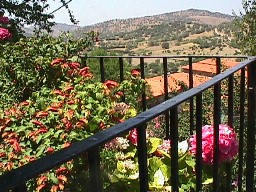 Andrea's sister Pamela has bought an old house in Vatousa, a traditional mountain village on the main road to the beach village of Erressos, the birthplace of Sapho and Mecca for the more widely known form of Lesbian. So camophlaged by the use of indiginous stones for building, and clinging to the side of a mountain, one might not even notice it as you round the bend and continue to the coast. But for us it is home, or would be home if the house was not not a total construction site full of workmen with wheelbarrows, piles of stone and plaster everywhere and a small cement-mixer in the kitchen. The house is a shell. We expected it to be finished except for the bathroom, which would have been a minor inconvenience though not anything we had not suffered before. Andrea seems dismayed and can not show the proper enthusiasm as Pamela gives us the grande tour and we try to imagine what it would eventually look like. We were to have the large room downstairs. The windows upstairs look down on a spectacular view of
the lower village and the entire valley. Pamela glows with pride as she leads us from room to room, particularly when she shows the kitchen. One wall is the side of the mountain and an enormous boulder protrudes several feet into the room. When she told the workers she wanted to keep it they told her she was crazy and begged her to let them dynamite it. But she stuck with the rock and has great plans for it. Already I can tell that it will be a conversation piece for many years to come.
Andrea's sister Pamela has bought an old house in Vatousa, a traditional mountain village on the main road to the beach village of Erressos, the birthplace of Sapho and Mecca for the more widely known form of Lesbian. So camophlaged by the use of indiginous stones for building, and clinging to the side of a mountain, one might not even notice it as you round the bend and continue to the coast. But for us it is home, or would be home if the house was not not a total construction site full of workmen with wheelbarrows, piles of stone and plaster everywhere and a small cement-mixer in the kitchen. The house is a shell. We expected it to be finished except for the bathroom, which would have been a minor inconvenience though not anything we had not suffered before. Andrea seems dismayed and can not show the proper enthusiasm as Pamela gives us the grande tour and we try to imagine what it would eventually look like. We were to have the large room downstairs. The windows upstairs look down on a spectacular view of
the lower village and the entire valley. Pamela glows with pride as she leads us from room to room, particularly when she shows the kitchen. One wall is the side of the mountain and an enormous boulder protrudes several feet into the room. When she told the workers she wanted to keep it they told her she was crazy and begged her to let them dynamite it. But she stuck with the rock and has great plans for it. Already I can tell that it will be a conversation piece for many years to come.
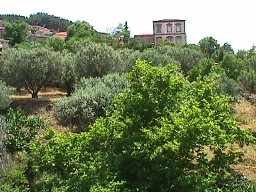 We climb furthur up the mountains to the last house and then through a gate into a field of olive and fig trees. The figs are black and oozing syrup. Amarandi eats them as fast as we can pick them. I recall being in America and thinking about the ripe figs of September. It was one of the inspirations of the trip that had kept me going in the terrible hot humid North Carolina summer. Here is my reward for three months of suffering. I eat two fat and delicious, but I long for something more substantial. We continue climbing to the top of the hill where we sit on a giant cement incased cystern that contains water for the whole village. It is pumped up from springs beneath, then released to flow downhill to the many faucets and toilets below. The view of the village is inspiring, the rooftops a sea of ceramic tiles and the valley beyond is green with olive fig and walnut trees.
We climb furthur up the mountains to the last house and then through a gate into a field of olive and fig trees. The figs are black and oozing syrup. Amarandi eats them as fast as we can pick them. I recall being in America and thinking about the ripe figs of September. It was one of the inspirations of the trip that had kept me going in the terrible hot humid North Carolina summer. Here is my reward for three months of suffering. I eat two fat and delicious, but I long for something more substantial. We continue climbing to the top of the hill where we sit on a giant cement incased cystern that contains water for the whole village. It is pumped up from springs beneath, then released to flow downhill to the many faucets and toilets below. The view of the village is inspiring, the rooftops a sea of ceramic tiles and the valley beyond is green with olive fig and walnut trees.
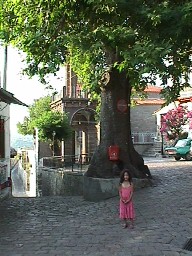 We go for lunch in the large cafeneon that is strangly quiet and empty. The owner, Tryphonos, is glad to see us and serves us a cheesey scrambled egg concoction, a tomato and feta salad, a plate of fried gopas and some village bread. We are joined by Anna, a British artist from Brooklyn, NY, who is obsessed with a problem of cracking paint on the small experimental icons she has made. No matter where we lead the conversation she brings it back to the cracking facade and none of the remedies we suggest seem to satisfy her. When she leaves, Pamela continues talking about the house. She wants more appreciation from us, the first of her close family to see it. Andrea keeps saying "it's wonderful, it's great" but Pamela wants more precise compliments. I can see that it's difficult for Andrea because she is still in a state of shock because the house is so unfinished. I'm worried that Pamela's persistant prodding will cause Andrea to snap at any moment and scream at her sister to shut-up already about the house, bu
t Andrea is under control. We drink our first official ouzos, portions so generous that she can't finish hers and I am reluctant to drive to the next village of Xidera, Andrea's ancestral home, where we will be staying.
We go for lunch in the large cafeneon that is strangly quiet and empty. The owner, Tryphonos, is glad to see us and serves us a cheesey scrambled egg concoction, a tomato and feta salad, a plate of fried gopas and some village bread. We are joined by Anna, a British artist from Brooklyn, NY, who is obsessed with a problem of cracking paint on the small experimental icons she has made. No matter where we lead the conversation she brings it back to the cracking facade and none of the remedies we suggest seem to satisfy her. When she leaves, Pamela continues talking about the house. She wants more appreciation from us, the first of her close family to see it. Andrea keeps saying "it's wonderful, it's great" but Pamela wants more precise compliments. I can see that it's difficult for Andrea because she is still in a state of shock because the house is so unfinished. I'm worried that Pamela's persistant prodding will cause Andrea to snap at any moment and scream at her sister to shut-up already about the house, bu
t Andrea is under control. We drink our first official ouzos, portions so generous that she can't finish hers and I am reluctant to drive to the next village of Xidera, Andrea's ancestral home, where we will be staying.
Amarandi is so enamoured with Pamela that she won't let he out of her sight for a moment. She seems like she is ready to jettison her parents and take up life with her Thea Pammy, as she calls her. Pam is only too happy to hold Amarandi and carry her from place to place. Amarandi is delighted that she has found someone who is not tired of holding her and carrying her from place to place. It's an excellent arrangement for all involved but I wonder how long it will take before Pamela feels like she is being used and Amarandi starts looking for her next ride.
The village of Xidera could be the most remote village in all of Greece, perhaps on a par with some of the jungle villages of the Brazillian rain forest except for the fact that they have TV's and drive pick-up trucks. It's at the end of a road that leads nowhere else. There is no bus. It is surrounded by wooded mountains, fields and olive groves. The inhabitants are all farmers, though some also make their living as carpenters, butchers and cafe owners. In a village of less then five hundred people there are seven cafeneons, all filled with men at various hours of the day and night. The women spend their days working at home. Everything comes from the village with the exception of the few things they cannot make like plastic buckets, shoes and fish, which are sold from pick-up trucks that travel from village to village. In the evening when their work is done and the men are gathered in the cafeneons to argue politics, play cards or watch the upcomming elections on TV, the women sit on the steps outside the g
ates, of the walls that enclose their gardens and homes, talking and greeting whoever passes by.
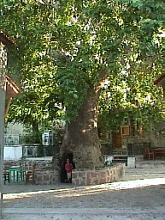 Our arrival in the village is conspicuous. The main platia is full of cars and with the help of an old man we are able to wedge ours between the wall of a cafeneon and the giant platanos tree in the middle of the square. The center of the tree is hollow, the size of a small room and for some reason filled with tires. By the time we are parked the whole village knows we are here. We grab our bags and find our way up the narrow streets to the house of Andrea's grandmother. Though slightly more livable, the house is clearly headed in the opposite direction of Pamela's. The relatives had contributed money for new windows, shutters and a roof. Unfortunately there was no glass in the windows, and the house next door had collapsed, leaving a big open space where the new roof ends and an ominous crack in the wall, so wide that you can see the light from outside. Still it's better then the last time we came when we took one look and ran in the other direction. Pam has cleaned it up and there are enough mattresses to g
o around. I plop down on the ground floor, read the baseball page in the USA Today, and fall asleep. When I wake up, the girls are vacuuming upstairs, sending dust and debris from the decaying walls falling through the cracks in the floor onto my face.
Our arrival in the village is conspicuous. The main platia is full of cars and with the help of an old man we are able to wedge ours between the wall of a cafeneon and the giant platanos tree in the middle of the square. The center of the tree is hollow, the size of a small room and for some reason filled with tires. By the time we are parked the whole village knows we are here. We grab our bags and find our way up the narrow streets to the house of Andrea's grandmother. Though slightly more livable, the house is clearly headed in the opposite direction of Pamela's. The relatives had contributed money for new windows, shutters and a roof. Unfortunately there was no glass in the windows, and the house next door had collapsed, leaving a big open space where the new roof ends and an ominous crack in the wall, so wide that you can see the light from outside. Still it's better then the last time we came when we took one look and ran in the other direction. Pam has cleaned it up and there are enough mattresses to g
o around. I plop down on the ground floor, read the baseball page in the USA Today, and fall asleep. When I wake up, the girls are vacuuming upstairs, sending dust and debris from the decaying walls falling through the cracks in the floor onto my face.
Pamela has our vacation all planned for us. I overhear her telling Andrea of all the work that need to be done. Shutters to be painted, doors to be repaired. My job is the door to the outhouse which is dangling precariously, ready to fall on the lap of some unlucky person, squatted on the tiny ceramic toilet with the plastic seat. It looks easy enough except that I have to be in there with the door closed in order to make the hinges fit. A screwdriver and three screws have been placed in my room and serve as a grim reminder of my duties. The sooner I do it, the sooner I can stop looking at them and thinking about it. There is also a jar of spackel which I am ignoring until I am given instructions to do otherwise.
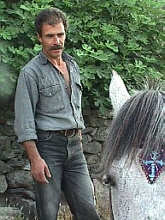 Amarandi and Pam call to us from outside the gate. We open it to see them sitting on a horse being pulled by a boy named Vassili, the son of Thanasis who owns the cafeneon across from Andrea's Aunt Avgalia's where we eat all our meals. It's Amarandi's first time on horseback. Later we run into the father, Thanasis on his way to his field. He puts Amarandi on the horse for her first solo horseback ride. Thanasis picks a bag full of grapes, walnuts and figs which he gives to us as a welcoming gift.
Amarandi and Pam call to us from outside the gate. We open it to see them sitting on a horse being pulled by a boy named Vassili, the son of Thanasis who owns the cafeneon across from Andrea's Aunt Avgalia's where we eat all our meals. It's Amarandi's first time on horseback. Later we run into the father, Thanasis on his way to his field. He puts Amarandi on the horse for her first solo horseback ride. Thanasis picks a bag full of grapes, walnuts and figs which he gives to us as a welcoming gift.
When we return to the house to leave Thanasis gift, Andrea and Pamela are walking down the street in the other direction. We catch up and find ourselves back by Thanasis field, and then to the home of two women who read coffee cups. One is suffering from something in her gums. Andrea suggests the Australian tea tree oil that I had bought for the swimmers ear I had picked up the previous summer when I was spearfishing every day. I run back to the house to get it. I warn the woman to dilute it. When I had used it the first time I dripped some into my ear and it burned like hell. I couldn't hear for a whole day. The next time I diluted it with water and kept it in a plastic cup. A half an hour later I picked up the cup and the bottom fell off. It was strong stuff, but didn't help my ear condition though thankfully I can still hear. I tell her to be carefull with it, partly out of fear for myself. Anyone who can read coffee grinds can probably also put the evil eye on the person who gave them medicine that made t
heir teeth fall out.
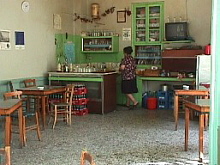 Two of the women give Pam a long discourse on what they see in her cup. We all listen attentively. When it's Andrea's turn the first woman completes her interpretation but before the second can look, Pamela is asking Andrea about the ring she is wearing that she made for herself. Andrea is only too happy to talk about it and the big sale she made in New York the day we left for Greece. Not only is the fortune forgotten, but so are the women while Andrea and Pam blab on in English. I tell them that it's time to go. Every relative knows we are in the village and are waiting at Avgalia's cafeneon to greet us. It's rude to keep them waiting. Actually, by this time I have seen them all and so has Amarandi since we have passed the cafe numerous times in the last hour, but Andrea hasn't. I finally get them out the door and walking down the street, but every door they pass has someone in it who wants to welcome them. I give up and go to the cafe to wait. By now all the relatives have given up and it's just Avgalia, w
ho is cooking for the old men, and her son Stavros who is across the street where he has just butchered a lamb and is now cleaning out the intestines and internal organs to make patsa or kokoretsi.
Two of the women give Pam a long discourse on what they see in her cup. We all listen attentively. When it's Andrea's turn the first woman completes her interpretation but before the second can look, Pamela is asking Andrea about the ring she is wearing that she made for herself. Andrea is only too happy to talk about it and the big sale she made in New York the day we left for Greece. Not only is the fortune forgotten, but so are the women while Andrea and Pam blab on in English. I tell them that it's time to go. Every relative knows we are in the village and are waiting at Avgalia's cafeneon to greet us. It's rude to keep them waiting. Actually, by this time I have seen them all and so has Amarandi since we have passed the cafe numerous times in the last hour, but Andrea hasn't. I finally get them out the door and walking down the street, but every door they pass has someone in it who wants to welcome them. I give up and go to the cafe to wait. By now all the relatives have given up and it's just Avgalia, w
ho is cooking for the old men, and her son Stavros who is across the street where he has just butchered a lamb and is now cleaning out the intestines and internal organs to make patsa or kokoretsi.
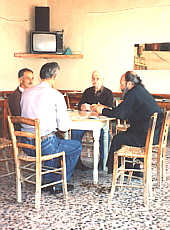 The window ledge in Avgalia's is littered with political posters and brochures. As we eat our dinner, one of the candidates charges in, shaking hands and greeting everyone, including us until he realizes we are Americans. He acknowledges us in perfect English which takes me by surprise but doesn't waste any time with us. In a flash he is out the door and across the street to Thanasis' cafe where he shakes hands with all the old men, temporarilly breaking up their card game. I read the pamphlet he has given me and discover that he got his degree from Boston College and then studied economics at Cambridge. He's with the new Political Spring Party one of the small alternatives to Pasok and New Democracy. A few minutes later I can hear his voice booming through the village. On my way home I stop in the main square where he has set up a small but loud PA system at the cafeneon where the young guys hang out. He's practically shouting as he exhorts all the men to support him, so that he may support them. Several tim
e his voice cracks and I am reminded of Clinton at the end of his first presidential campaign. The old men in the cafe across the street from him look bored, but when he is finished they break into a thunderous applause. He sits down at one of the tables where there is a cold beer waiting for him and continues to talk with the other men sitting with him. I imagine him going to every village doing this and I am impressed, but I wonder if he is sincere about recognizing their needs and representing these poor farmers, or does he just want a piece of the pie?
The window ledge in Avgalia's is littered with political posters and brochures. As we eat our dinner, one of the candidates charges in, shaking hands and greeting everyone, including us until he realizes we are Americans. He acknowledges us in perfect English which takes me by surprise but doesn't waste any time with us. In a flash he is out the door and across the street to Thanasis' cafe where he shakes hands with all the old men, temporarilly breaking up their card game. I read the pamphlet he has given me and discover that he got his degree from Boston College and then studied economics at Cambridge. He's with the new Political Spring Party one of the small alternatives to Pasok and New Democracy. A few minutes later I can hear his voice booming through the village. On my way home I stop in the main square where he has set up a small but loud PA system at the cafeneon where the young guys hang out. He's practically shouting as he exhorts all the men to support him, so that he may support them. Several tim
e his voice cracks and I am reminded of Clinton at the end of his first presidential campaign. The old men in the cafe across the street from him look bored, but when he is finished they break into a thunderous applause. He sits down at one of the tables where there is a cold beer waiting for him and continues to talk with the other men sitting with him. I imagine him going to every village doing this and I am impressed, but I wonder if he is sincere about recognizing their needs and representing these poor farmers, or does he just want a piece of the pie?
My room terrifies me. I imagine scores of scorpions, centipedes and spiders coming through the holes in the floor to enjoy my body heat. I drag my mattress up the narrow collapsing spiral staircase and plop it next to Andrea. I easily fall asleep even though there is so much dust in the air I can barely breathe.